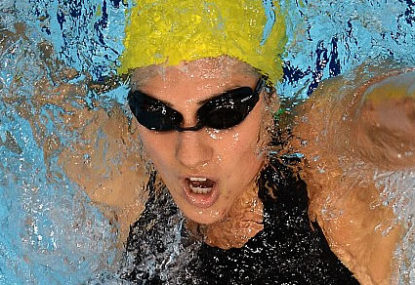JackJumpers' NBL title was special - but where does it sit among Tasmania’s top ten sporting moments?
It’s a pretty good time to be a Tasmanian sports fan right now. After years in the sporting wilderness with not much to celebrate,…

There is a public misconception that elite swimmers in Australia are on the gravy train; that they earn mega bucks. In recent weeks that myth has been debunked.
It is on the record now that of the 47 swimmers on the Australian Olympic team, only five earned over $30,000 while only 11 earned over the minimum wage.
The reality is that most swimmers are supported financially by their parents or struggle on their own to continue in their sport.
Many of them never reach their peak or quit, unable to devote the necessary time required to reach the pinnacle of their sport.
So why doesn’t a swimmer work as well as train like many sports people can do?
A week in the life of a swimmer consists of a very early morning rise for a pool session of two to two and a half hours. This is followed by an afternoon encore of about the same timeframe.
The five or so hours in between is taken up by gym work, dry land training, physio and massage sessions and recovery. That equates to about 35 to 40 hours over five or so days per week.
If a swimmer does not follow a training regime of this kind there can be no expectation of getting into a final at the Olympics or World Championship, let alone stand on a medal-winning dias.
There is no opportunity to earn an income without compromising a swimmer’s performance. A swimmer improves incrementally over months and years.
To reduce the time for a 100 metre race by one or two seconds can literally take years of training at this level of intensity.
Swimming is one of those sports that needs to be funded if we expect world-class results because swimmers cannot hold a professional role and be at the top of their sport.
During the recent debate I have not heard anyone say that swimming needs more funding.
All reports suggest that swimming in Australia is appropriately funded from the public purse and supplemented by corporate sponsorship.
So why are so many swimmers on the Olympic team earning so little?
If we want an even better return on our investment, then we can ask our swimmers to contribute back to the community. We can ask them to give back to the sport to recompense for the benefits they have received.
Well, the reality is that this is already happening. Many swimmers give back to their communities in many different ways.
Many have charities they support, others respond to requests for appearances to inspire others, while others promote their sport to the youth of our community.
Here is a side of elite swimmers that doesn’t often make the public arena. It is one example but it is not an isolated case: six Olympians and ex-Olympians from Brisbane have donated their weekend to promote swimming to the young and not so young in Cairns.
Many Olympians have given much of their time to return to their schools to inspire the next generation; they have supported their local clubs with appearances and have been involved in sprint clinics and the like.
The reality is that the majority of elite athletes will finish their sports career financially disadvantaged. They don’t complain about that and they don’t do it for the money.
In the case of swimmers, they are not complaining about the quantum of funding that is available; what they are concerned about is that they are not receiving an appropriate share of what is available.
When you look at the model of administration of their sport you find a QUANGO: a quasi-autonomous non-government organisation; an administrative body indirectly sanctioned by government and set up for the express purpose of managing the funding and welfare of the sport. On the face of it, it seems an ideal body to manage the sport.
But when examining the structure, costs and administration that are layered onto the sport, one can only wonder whether it is the most appropriate system of sports management.
If it is, then where are the rules governing such a body and are they strong enough?
What are legitimate expenses for a QUANGO to operate and what is abuse or even fraud? Who sets salary levels and increments? Who are the boards, CEOs and upper management ultimately accountable to for the appropriate expenditure of public funding? Where is the transparency so that accountability can contribute to the prevention of maladministration?
There are many QUANGOs operating around Australia for various purposes. It would make an interesting comparison to audit and even rate them in terms of their stated aims and objectives.
I trust that the Swimming Australia review that has been taken out of its control will provide some much needed transparency; that will lead to recommendations for long-term structural changes and will answer these questions and more.